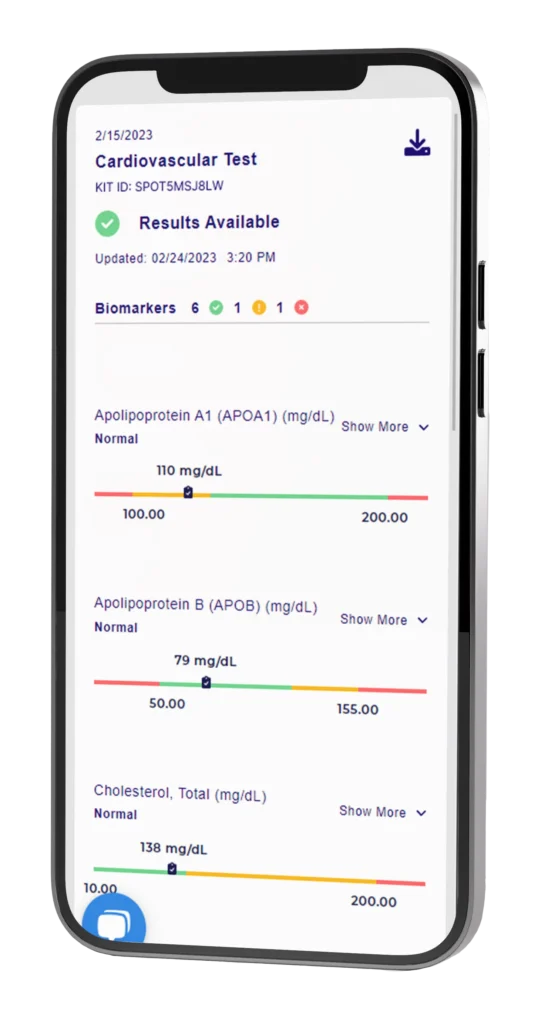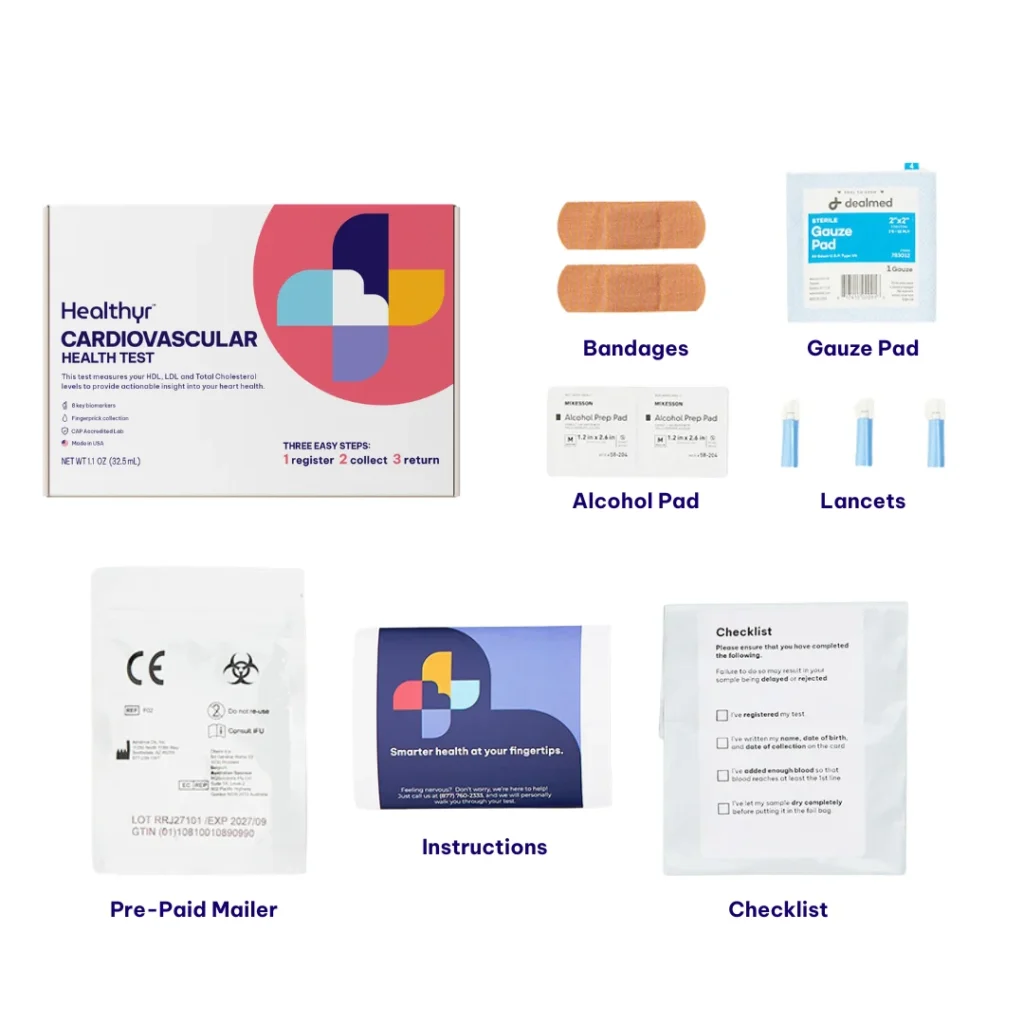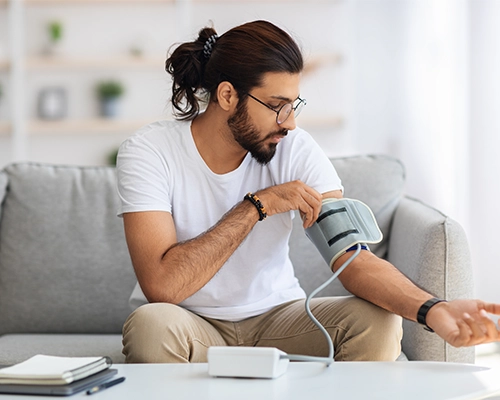Cardiovascular Health Test
$79.99
Free Shipping
Test for 8 key indicators of cardiovascular health to assess your risk for heart disease, stroke, and heart attack.
Not available in NY State.
Tests For:
Cholesterol, High-Density Lipoprotein (HDL), Low-Density Lipoprotein (LDL), Cholesterol Ratio, Triglycerides, Apolipoprotein A1 (APOA1), Apolipoprotein B (APOB), High Sensitivity C-Reactive Protein, and Cortisol.

Pay in 4 easy payments with PayPal Pay Later or Afterpay
- FSA/HSA Eligible
- For adults 18+
- Results in 7 days
- FSA/HSA Eligible
- For adults 18+
- Results in 7 days
Biomarkers tested
- Apolipoprotein A1 (APOA1)
- Apolipoprotein B (APOB)
- Cholesterol
- Cortisol
- High-Density Lipoproteins (HDL)
- High-Sensitivity CRP
- Low-Density Lipoproteins (LDL)
- Triglycerides
Apolipoprotein A1 (APOA1)
ApoA-1 promotes the formation of HDL (healthy cholesterol). Low ApoA-1 may cause low HDL and put you at risk of developing cardiovascular disease. Adapting healthy habits like sleeping, exercising, and eating healthy foods can improve ApoA-1 levels, but there may also be underlying genetic causes for low ApoA-1.
Apolipoprotein B (APOB)
ApoB is a protein attached to unhealthy cholesterol like LDL, VLDL, and IDL and allows these types of cholesterols into your cells. Understanding your ApoB levels can help a care provider evaluate your cardiovascular health.
Cholesterol
Cholesterol is a waxy, fat-like substance that’s found in all the cells in your body. Your body needs some cholesterol to make hormones, vitamin D, and substances that help you digest foods. However, if you have too much cholesterol in your blood it can combine with other substances in the blood to form plaque. Plaque sticks to the walls of your arteries, which can develop into atherosclerosis and lead to cardiovascular disease.
Cortisol
Cortisol affects several aspects of your body including regulating your stress response, immune system and inflammation, blood pressure, heart rate, glucose metabolism. Cortisol levels can impact your cardiovascular health, risk for diabetes, immune system, fertility, and even cognition.
High-Density Lipoproteins (HDL)
Often referred to as “good cholesterol” HDL (high-density lipoprotein) is a type of cholesterol that is associated with better cardiovascular health. HDL helps clear unhealthy cholesterol, like LDL, out of your body. Understanding your HDL levels can help a care provider evaluate your cardiovascular health.
High-Sensitivity CRP
High-sensitivity C-reactive protein (hsCRP) is a test to measure inflammation in your body, which may be caused by injury, infection, chronic disease, or certain medications. In combination with the other biomarkers on this panel, it may be helpful in determining if you have inflammation associated with diabetes, prediabetes or lipid disorders.
Low-Density Lipoproteins (LDL)
Often referred to as “bad cholesterol” LDL (low-density lipoprotein) is a form of cholesterol that may increase your risk of developing atherosclerosis, the most common cause of cardiovascular disease. Understanding your LDL levels can help a care provider evaluate your cardiovascular health.
Triglycerides
If you eat more calories than you need, your body turns the extra calories into triglycerides and stores them in your fat cells to use later. A high blood triglyceride level usually doesn’t cause any symptoms, but over time it may affect your arteries and increase your risk of developing cardiovascular disease. Understanding your triglyceride levels can help a care provider evaluate your cardiovascular health.
Biomarkers tested
Cholesterol
High-Density Lipoprotein (HDL)
Low-Density Lipoprotein (LDL)
Cholesterol Ratio
Triglycerides
Apolipoprotein A1 (APOA1)
Apolipoprotein B (APOB)
High Sensitivity CRP
Cortisol.
What is it and how does it affect me?
ApoA-1 promotes the formation of HDL (healthy cholesterol). Low ApoA-1 may cause low HDL and put you at risk of developing cardiovascular disease. Adapting healthy habits like sleeping, exercising, and eating healthy foods can improve ApoA-1 levels, but there may also be underlying genetic causes for low ApoA-1.
What is it and how does it affect me?
ApoB is a protein attached to unhealthy cholesterol like LDL, VLDL, and IDL and allows these types of cholesterols into your cells. Understanding your ApoB levels can help a care provider evaluate your cardiovascular health.
What is it and how does it affect me?
Cholesterol is a waxy, fat-like substance that’s found in all the cells in your body. Your body needs some cholesterol to make hormones, vitamin D, and substances that help you digest foods. However, if you have too much cholesterol in your blood it can combine with other substances in the blood to form plaque. Plaque sticks to the walls of your arteries, which can develop into atherosclerosis and lead to cardiovascular disease.
What is it and how does it affect me?
Cortisol affects several aspects of your body including regulating your stress response, immune system and inflammation, blood pressure, heart rate, glucose metabolism. Cortisol levels can impact your cardiovascular health, risk for diabetes, immune system, fertility, and even cognition.
What is it and how does it affect me?
Often referred to as “good cholesterol” HDL (high-density lipoprotein) is a type of cholesterol that is associated with better cardiovascular health. HDL helps clear unhealthy cholesterol, like LDL, out of your body. Understanding your HDL levels can help a care provider evaluate your cardiovascular health.
What is it and how does it affect me?
High-sensitivity C-reactive protein (hsCRP) is a test to measure inflammation in your body, which may be caused by injury, infection, chronic disease, or certain medications. In combination with the other biomarkers on this panel, it may be helpful in determining if you have inflammation associated with diabetes, prediabetes or lipid disorders.
What is it and how does it affect me?
Often referred to as “bad cholesterol” LDL (low-density lipoprotein) is a form of cholesterol that may increase your risk of developing atherosclerosis, the most common cause of cardiovascular disease. Understanding your LDL levels can help a care provider evaluate your cardiovascular health.
What is it and how does it affect me?
If you eat more calories than you need, your body turns the extra calories into triglycerides and stores them in your fat cells to use later. A high blood triglyceride level usually doesn’t cause any symptoms, but over time it may affect your arteries and increase your risk of developing cardiovascular disease. Understanding your triglyceride levels can help a care provider evaluate your cardiovascular health.
Results you can trust + understand
- At-home diagnostic test
- Easy finger prick collection
- Lab results within days
- Track your lab information all in one place
- Secure portal with personalized next steps




Your kit comes with everything you need to collect your sample
- Lancets
- Pre-paid Mailer
- Bandages
- Alcohol Pad
- Checklist
- Gauze Pad
- Instructions
- Takes just 15-20 minutes
- Discreet packaging
- CLIA Lab Certified
- Takes just 15-20 minutes
- Discreet packaging
- CLIA Lab Certified
How it works
Register
Register your test online using the unique ID number that comes with the kit.
Collect
Following the instructions provided, collect your sample – it’s fast and easy!
Return
Mail your sample to our lab using the prepaid envelope included in your test kit.
Results
Receive your private HIPAA compliant results to your Healthyr portal in 3 days!


Test Smarter, Not Harder
Healthyr uses microsampling technology to offer health tests that can be done in the comfort of your home. There is no need to visit a medical professional or lab– you collect your sample yourself using a simple finger prick.
This test is for you


If you are over the age of 20.
It is recommended that everyone over the age of 20 test their heart health every four to six years. However, if one of your markers, such as blood pressure, is high, you may want to check more often.


If you have high blood pressure.
High blood pressure damages the arteries and affects blood flow, causing heart disease and putting you at greater risk of heart attack, stroke, and heart failure.


If you have Type 1 or Type 2 Diabetes.
High blood sugar damages the vessels and nerves in the heart and circulatory system. Over time, this can lead to heart disease, stroke, or heart attack as well as other concerns such as kidney disease. If you are diabetic, you are twice as likely to have heart disease or a stroke than a non-diabetic.


If you have a family history of heart disease.
If you have a close relative such as a parent, sibling, or grandparent who has been diagnosed with heart disease, you may be at greater risk of developing heart disease yourself. Checking your cardiovascular health more often can ensure you catch warning signs early.


If your Cholesterol, LDL, or Triglyceride results were elevated in another Healthyr test.
If you received an elevated result on a biomarker related to cardiovascular health, such as Cholesterol, LDL, or Triglycerides.


If you take medication for blood pressure or cholesterol.
The Adult Treatment Panel guidelines (ATP III) recommends testing lipids every 4-6 months while taking a statin.
About our labs and science
Accuracy
+
Reliability
Lab Safety
+
Sterility
Privacy
+
Security
Our tests use an accurate and reliable form of microsampling called Dried Blood Spot Testing. This form of testing has been used since the 1960s in Neonatal care and for testing in remote locations. You may be familiar with the heel prick performed on newborns during their initial health assessment– this is Dried Blood Spot Testing.
Our state-of-the-art lab is CLIA-certified and CAP-accredited. We pride ourselves on our use of validated and reliable testing methods as well as our stringent quality control measures.
If you would like to learn more about our lab processes and accreditations, check out our labs & science page.
Healthyr adheres to strict privacy and security measures to protect your personal health information. Our technology has encryption and safety protocols in place and every employee, from customer service to CEO, is trained in HIPAA compliance.
Frequently Asked Questions
Your blood test is most accurate if you take it fasted, meaning before you have anything to eat or drink (other than water). We recommend taking it first thing in the morning.
Using the Kit ID number, register your test on behealthyr.com. This number is anonymous in our system but allows us to notify you when your test arrives at the lab and your results are ready. It also ensures the lab is able to connect your results to you.
Next, take a moment to get your blood flowing. This will help make your sample collection easier. Drink a tall glass of water for hydration, then wash your hands for a least one minute in warm water to improve circulation and blood flow.
Clean the finger you want to prick with the alcohol wipe. Remove the lancet cap then hold the lancet against the tip of your finger. Press the lancet button to perform the finger prick. Next, hold your pricked finger over the ADX card’s sample collection window. You can gently squeeze your finger to get more droplets (you’ll need about 8 drops in total to fill the card). You may also perform a “milking” motion, applying gentle pressure on either side of the base of your finger and slowly moving toward the fingertip.
Once filled, leave your ADX card to dry for at least one hour. Meanwhile, clean up and dispose of the used collection tools by sealing them into a bag and placing them in the garbage. As soon as your sample is dry, place it into the sample bag and then slide it into the prepaid envelope. You’ll want to mail your test the same day, so head to your nearest mailbox and drop it inside.
You will be notified when your sample arrives at the lab and then again when your results are ready to view.
Yes. We recommend taking your Cardiovascular Health Test first thing in the morning before you eat or drink anything (other than water, of course!) to ensure accurate results. This includes supplements, so please wait until after your test to take your morning multivitamin or similar.
The American Heart Association recommends testing for cholesterol every 4-6 years in normal-risk adults. If you have high blood pressure, diabetes, or are obese, you may want to test more frequently. People taking statins to manage their cholesterol levels should test every 4-6 months.
If you receive a result that is out of the normal range, it is important that you speak to a physician to discuss the next steps. Make an appointment with your doctor, or if you do not have one, book a low-cost telehealth appointment with Sesame Care today. You can download your results to a PDF and either email them to your physician or print them to bring to your next appointment.
Yes. Due to increases in Estrogen, it is common for women to experience elevated cholesterol during pregnancy. High cholesterol during pregnancy can lead to preterm birth, preeclampsia, and gestational diabetes, so it’s important to know your levels and speak to a provider if you have elevated cholesterol during pregnancy.
Yes, there is no reason you cannot take the Cardiovascular Health Test while on your period.
No, medications will not interfere with the accuracy of the test. However, your results may reflect the impacts that certain medications may be having on your biomarker levels.
No, supplementation will not interfere with the accuracy of the test.
No, insurance is not required for any of Healthyr’s at-home health tests.
No, supplementation will not interfere with the accuracy of the test. However, your results may reflect the impacts that medication or vitamin supplementation may have on your blood biomarkers.
Nope! Everything, from lab fees to the envelope you mail your sample in, is included in the price of your test.
Have more questions? Contact us!
Our team of experts is available Monday-Friday 9 AM – 9 PM EST to answer your questions, troubleshoot issues, and provide guidance on best practices.

